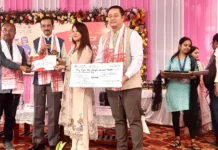[Nyatum Doke]
Reform 3.0, with 24 citizen-centric policies, recently released by the government of Arunachal Pradesh, is commendable. It stands as testimony that the new government is committed to ensuring an inclusive growth, and that it is a government which is determined to establish a developed Arunachal. The reform agenda includes policies on digitisation, youth empowerment, education, sports, employment, delivery of service, etc. In this regard, it is pertinent to discuss a few areas which may be considered by the GoAP to make the budget more vibrant.
Digitisation vs digital literacy
One of the major focuses is on the digitisation drive to achieve 100 per cent digitization. However, it is to be remembered that digitisation without imparting digital literacy is futile. Though, for a single department, say for finance & planning, it may auger well, at large it may not work out as expected. The focus should be on digital literacy of officers, officials, and other staffs of various establishments. The target, then, should be 100 per cent digitally literate departments instead.
Then, the government is shifting towards a bottom-up approach in the planning process, along with efforts of digitisation. In this regard, there is also a need for a comprehensive policy on the community digital literacy programme – a dedicated programme in each district to impart digital literacy at the grassroots level, especially to educated women and youths,along with the gram panchayat members.
Digital education system
In the same line, when we talk about digitisation and education, the first step may be 100 per cent digital and physical connectivity; but then comes the need for a comprehensive digital education system. The digital education system developed by the Pune Smart City Development Corporation can be emulated. It has set up a platform to impart self-learning and connect knowledge of life outside the school with ‘anytime, anywhere learning’ as the motto, and it brings educators, learners, and school administrators on one platform. Then the software/app developed works seamlessly with all the operating systems.
Centralised portals
Another important area of focus is sports employment and youth empowerment. Concerning sports, apart from all the basic things, it is important to develop a state digital portal for sportspersons. It can be made as a centralised portal for sportspersons to avail of different services (pensions, scholarships and other financial and non-financial aids) offered by the government. It should also provide all information related to various sports and facilities, in reference to the state’s sports policy. It can be used for capacity building of the sports administrators, to conduct outreach programmes to find talents, etc.
The portal would help to enhance accountability in sports governance in the state. It will use technology to enhance and improve the sports ecosystem in Arunachal. Thereby, it will garner trust in sports governance, foster excellence, and encourage the youths to make careers out of sports.
Then, with regard to the issue of unemployment in the state, apart from policies related to employment generation, the government should consider creating a state career portal. At present, various information and advertisements for jobs are scattered on the websites of the different organisations. Often an aspirant is unaware of the advertisements of particular departments or districts because of the untimely dissemination of the information. Also, it is seen that sometimes fake advertisements are circulated by dubious organisations and individuals.
Therefore, in line with the national career portal, there is a need for one single portal where employment/job advertisements of all the departments and government organisations can be uploaded promptly. Also, various career options should be highlighted through career counselling videos by experts. The portal may also include a list of job seekers and employers, thereby bridging the gap between the supply and demand in the employment market. This state career portal would stand up to the government’s commitment to digitisation and efficient public delivery of services.
Future-proof skills
To add, skill development has always been a priority area of this government – the new ‘SEE trinity’ initiative highlights the same – this is indeed commendable. However, quality rather than quantity of skill is important in this age driven by technology. So, apart from the traditional areas of skill development for the unemployed youths, dropouts,etc, like carpentry, masonry, electrician, etc, the focus should slowly move towards emerging technologies like artificial intelligence robotics, and basic coding skills. In this regard, the government may think of a policy to impart the same to school, college, and university students of the state. It would help to enhance their employability in the future, and, in addition, our youths will be future-ready.
Decentralised campaigns
Efficient and effective delivery of public services has always been the prime concern of the government. For last-mile delivery, an important initiative of the government is the Seva Aapke Dwar, under which significant achievement has been witnessed. However, there is a need to revamp the programmeby making it more focused and target-oriented. Most schemes in various departments cannot be provided at the doorstep or in a single day. So the huge campaigns have a bearing on the exchequer.
Instead, some funds may be allotted to the circle officers for decentralised campaigns. Only those departments that can provide doorstep services should be taken to the camps and schemes. In other departments there should be a comprehensive awareness campaign through the IPT department under the Arunachal Rising campaign.
People’s participation in policymaking is the hallmark of this government. The people of Arunachal are looking forward to a budget that is comprehensive and all-inclusive; a budget that addresses the challenges, promotes innovation to bring positive changes, and makes the developmental process of the state sustainable and future-ready. (The contributor is DIPRO, Lohit.)

